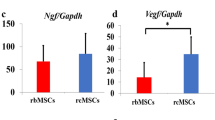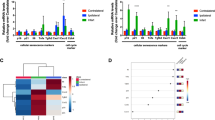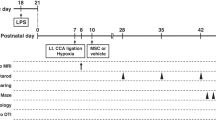Abstract
Aim:
To investigate the effects of mesenchymal stem cells (MSCs) transplantation on rat global cerebral ischemia and the underlying mechanisms.
Methods:
Adult male SD rats underwent asphxial cardiac arrest to induce global cerebral ischemia, then received intravenous injection of 5×106 cultured MSCs of SD rats at 2 h after resuscitation. In another group of cardiac arrest rats, tumor necrosis factor-α-induced protein 6 (TSG-6, 6 μg) was injected into the right lateral ventricle. Functional outcome was assessed at 1, 3, and 7 d after resuscitation. Donor MSCs in the brains were detected at 3 d after resuscitation. The level of serum S-100B and proinflammatory cytokines in cerebral cortex were assayed using ELISA. The expression of TSG-6 and proinflammatory cytokines in cerebral cortex was assayed using RT-PCR. Western blot was performed to determine the levels of TSG-6 and neutrophil elastase in cerebral cortex.
Results:
MSCs transplantation significantly reduced serum S-100B level, and improved neurological function after global cerebral ischemia compared to the PBS-treated group. The MSCs injected migrated into the ischemic brains, and were observed mainly in the cerebral cortex. Furthermore, MSCs transplantation significantly increased the expression of TSG-6, and reduced the expression of neutrophil elastase and proinflammatory cytokines in the cerebral cortex. Intracerebroventricular injection of TSG-6 reproduced the beneficial effects of MSCs transplantation in rats with global cerebral ischemia.
Conclusion:
MSCs transplantation improves functional recovery and reduces inflammatory responses in rats with global cerebral ischemia, maybe via upregulation of TSG-6 expression.
Similar content being viewed by others
Log in or create a free account to read this content
Gain free access to this article, as well as selected content from this journal and more on nature.com
or
References
Jones AE . Hypothermia after cardiac arrest: we can do this. Acad Emerg Med 2008; 15: 558–9.
Arrich J, Holzer M, Havel C, Müllner M, Herkner H . Hypothermia for neuroprotection in adults after cardiopulmonary resuscitation. Cochrane Database Syst Rev 2012; 9: CD004128.
Graves JR, Herlitz J, Bång A, Axelsson A, Ekström L, Holmberg M, et al. Survivors of out of hospital cardiac arrest: their prognosis, longevity and functional status. Resuscitation 1997; 35: 117–21.
Vaagenes P, Safar P, Moossy J, Rao G, Diven W, Ravi C, et al. Asphyxiation versus ventricular fibrillation cardiac arrest in dogs. Differences in cerebral resuscitation effects — a preliminary study. Resuscitation 1997; 35: 41–52.
Xiao F . Bench to bedside: brain edema and cerebral resuscitation: the present and future. Acad Emerg Med 2002; 9: 933–46.
Wang T, Tang W, Sun S, Xu T, Wang H, Guan J, et al. Intravenous infusion of bone marrow mesenchymal stem cells improves brain function after resuscitation from cardiac arrest. Crit Care Med 2008; 36: 486–91.
Parr AM, Tator CH, Keating A . Bone marrow-derived mesenchymal stromal cells for the repair of central nervous system injury. Bone Marrow Transplant 2007; 40: 609–19.
Toyama K, Honmou O, Harada K, Suzuki J, Houkin K, Hamada H, et al. Therapeutic benefits of angiogenetic gene-modified human mesenchymal stem cells after cerebral ischemia. Exp Neurol 2009; 216: 47–55.
Onda T, Honmou O, Harada K, Houkin K, Hamada H, Kocsis JD . Therapeutic benefits by human mesenchymal stem cells (hMSCs) and Ang-1 gene-modified hMSCs after cerebral ischemia. J Cereb Blood Flow Metab 2008; 28: 329–40.
Omori Y, Honmou O, Harada K, Suzuki J, Houkin K, Kocsis JD . Optimization of a therapeutic protocol for intravenous injection of human mesenchymal stem cells after cerebral ischemia in adult rats. Brain Res 2008; 1236: 30–8.
Komatsu K, Honmou O, Suzuki J, Houkin K, Hamada H, Kocsis JD . Therapeutic time window of mesenchymal stem cells derived from bone marrow after cerebral ischemia. Brain Res 2010; 1334: 84–92.
Horita Y, Honmou O, Harada K, Houkin K, Hamada H, Kocsis JD . Intravenous administration of glial cell line-derived neurotrophic factor gene-modified human mesenchymal stem cells protects against injury in a cerebral ischemia model in the adult rat. J Neurosci Res 2006; 84: 1495–504.
Wakabayashi K, Nagai A, Sheikh AM, Shiota Y, Narantuya D, Watanabe T, et al. Transplantation of human mesenchymal stem cells promotes functional improvement and increased expression of neurotrophic factors in a rat focal cerebral ischemia model. J Neurosci Res 2010; 88: 1017–25.
Zheng W, Honmou O, Miyata K, Harada K, Suzuki J, Liu H, et al. Therapeutic benefits of human mesenchymal stem cells derived from bone marrow after global cerebral ischemia. Brain Res 2010; 1310: 8–16.
Ohtaki H, Ylostalo JH, Foraker JE, Robinson AP, Reger RL, Shioda S, et al. Stem/progenitor cells from bone marrow decrease neuronal death in global ischemia by modulation of inflammatory/immune responses. Proc Natl Acad Sci U S A 2008; 105: 14638–43.
Zhang J, Li Y, Chen J, Yang M, Katakowski M, Lu M, et al. Expression of insulin-like growth factor 1 and receptor in ischemic rats treated with human marrow stromal cells. Brain Res 2004; 1030: 19–27.
Chen J, Li Y, Zhang R, Katakowski M, Gautam SC, Xu Y, et al. Combination therapy of stroke in rats with a nitric oxide donor and human bone marrow stromal cells enhances angiogenesis and neurogenesis. Brain Res 2004; 1005: 21–8.
Wang T, Tang W, Sun S, Wan Z, Xu T, Huang Z, et al. Mesenchymal stem cells improve outcomes of cardiopulmonary resuscitation in myocardial infarcted rats. J Mol Cell Cardiol 2009; 46: 378–84.
Castanheira P, Torquetti LT, Magalhãs DR, Nehemy MB, Goes AM . DAPI diffusion after intravitreal injection of mesenchymal stem cells in the injured retina of rats. Cell Transplant 2009; 18: 423–31.
Katz LM, Wang Y, Rockoff S, Bouldin TW . Low-dose Carbicarb improves cerebral outcome after asphyxial cardiac arrest in rats. Ann Emerg Med 2002; 39: 359–65.
Geocadin RG, Ghodadra R, Kimura T, Lei H, Sherman DL, Hanley DF, et al. A novel quantitative EEG injury measure of global cerebral ischemia. Clin Neurophysiol 2000; 111: 1779–87.
Albertsmeier M, Teschendorf P, Popp E, Galmbacher R, Vogel P, Böttiger BW . Evaluation of a tape removal test to assess neurological deficit after cardiac arrest in rats. Resuscitation 2007; 74: 552–8.
He ZJ, Huang ZT, Chen XT, Zou ZJ . Effects of matrix metalloproteinase 9 inhibition on the blood brain barrier and inflammation in rats following cardiopulmonary resuscitation. Chin Med J 2009; 122: 2346–51.
Xuan A, Long D, Li J, Ji W, Hong L, Zhang M, et al. Neuroprotective effects of valproic acid following transient global ischemia in rats. Life Sci 2012; 90: 463–8.
Orzyłowska O, Oderfeld-Nowak B, Zaremba M, Januszewski S, Mossakowski M . Prolonged and concomitant induction of astroglial immunoreactivity of interleukin-1beta and interleukin-6 in the rat hippocampus after transient global ischemia. Neurosci Lett 1999; 263: 72–6.
Stowe AM, Adair-Kirk TL, Gonzales ER, Perez RS, Shah AR, Park TS, et al. Neutrophil elastase and neurovascular injury following focal stroke and reperfusion. Neurobiol Dis 2009; 35: 82–90.
Matayoshi H, Hirata T, Yamashita S, Ishida K, Mizukami Y, Gondo T, et al. Neutrophil elastase inhibitor attenuates hippocampal neuronal damage after transient forebrain ischemia in rats. Brain Res 2009; 1259: 98–106.
Shimakura A, Kamanaka Y, Ikeda Y, Kondo K, Suzuki Y, Umemura K . Neutrophil elastase inhibition reduces cerebral ischemic damage in the middle cerebral artery occlusion. Brain Res 2000; 858: 55–60.
Hirko AC, Dallasen R, Jomura S, Xu Y . Modulation of inflammatory responses after global ischemia by transplanted umbilical cord matrix stem cells. Stem Cells 2008; 26: 2893–901.
Roddy GW, Oh JY, Lee RH, Bartosh TJ, Ylostalo J, Coble K, et al. Action at a distance: systemically administered adult stem/progenitor cells (MSCs) reduce inflammatory damage to the cornea without engraftment and primarily by secretion of TNF-α stimulated gene/protein 6. Stem Cells 2011; 29: 1572–9.
Danchuk S, Ylostalo JH, Hossain F, Sorge R, Ramsey A, Bonvillain RW, et al. Human multipotent stromal cells attenuate lipopolysaccharide-induced acute lung injury in mice via secretion of tumor necrosis factor-α-induced protein 6. Stem Cell Res Ther 2011; 2: 27.
Lee RH, Pulin AA, Seo MJ, Kota DJ, Ylostalo J, Larson BL, et al. Intravenous hMSCs improve myocardial infarction in mice because cells embolized in lung are activated to secrete the anti-inflammatory protein TSG-6. Cell Stem Cell 2009; 5: 54–63.
Choi H, Lee RH, Bazhanov N, Oh JY, Prockop DJ . Anti-inflammatory protein TSG-6 secreted by activated MSCs attenuates zymosan-induced mouse peritonitis by decreasing TLR2/NF-κB signaling in resident macrophages. Blood 2011; 118: 330–8.
Getting SJ, Mahoney DJ, Cao T, Rugg MS, Fries E, Milner CM, et al. The link module from human TSG-6 inhibits neutrophil migration in a hyaluronan- and inter-alpha-inhibitor-independent manner. J Biol Chem 2002; 277: 51068–76.
Milner CM, Higman VA, Day AJ . TSG-6: a pluripotent inflammatory mediator? Biochem Soc Trans 2006; 34: 446–50.
Bárdos T, Kamath RV, Mikecz K, Glant TT . Anti-inflammatory and chondroprotective effect of TSG-6 (tumor necrosis factor-alpha-stimulated gene-6) in murine models of experimental arthritis. Am J Pathol 2001; 159: 1711–21.
Mindrescu C, Thorbecke GJ, Klein MJ, Vilcek J, Wisniewski HG . Amelioration of collagen-induced arthritis in DBA/1J mice by recombinant TSG-6, a tumor necrosis factor/interleukin-1-inducible protein. Arthritis Rheum 2000; 43: 2668–77.
Oh JY, Roddy GW, Choi H, Lee RH, Ylöstalo JH, Rosa RH Jr, et al. Anti-inflammatory protein TSG-6 reduces inflammatory damage to the cornea following chemical and mechanical injury. Proc Natl Acad Sci U S A 2010; 107: 16875–80.
Uccelli A, Benvenuto F, Laroni A, Giunti D . Neuroprotective features of mesenchymal stem cells. Best Pract Res Clin Haematol 2011; 24: 59–64.
Acknowledgements
This study was supported in part by a research grant from National Natural Science Foundation of China (81272061) and the Fundamental Research Funds for the Central Universities and Yat-Sen Scholarship for Young Scientists
We thank Xing-yong CHEN for his assistance with pathological examination.
Author information
Authors and Affiliations
Corresponding author
Rights and permissions
About this article
Cite this article
Lin, Qm., Zhao, S., Zhou, Ll. et al. Mesenchymal stem cells transplantation suppresses inflammatory responses in global cerebral ischemia: contribution of TNF-α-induced protein 6. Acta Pharmacol Sin 34, 784–792 (2013). https://doi.org/10.1038/aps.2012.199
Received:
Accepted:
Published:
Issue date:
DOI: https://doi.org/10.1038/aps.2012.199
Keywords
This article is cited by
-
Dapoxetine prevents neuronal damage and improves functional outcomes in a model of ischemic stroke through the modulation of inflammation and oxidative stress
Naunyn-Schmiedeberg's Archives of Pharmacology (2024)
-
Neuroprotection of Stem Cells Against Ischemic Brain Injury: From Bench to Clinic
Translational Stroke Research (2023)
-
Enhanced neuroprotective efficacy of bone marrow mesenchymal stem cells co-overexpressing BDNF and VEGF in a rat model of cardiac arrest-induced global cerebral ischemia
Cell Death & Disease (2017)
-
A review of therapeutic effects of mesenchymal stem cell secretions and induction of secretory modification by different culture methods
Journal of Translational Medicine (2014)
-
Progress and prospects in stem cell therapy and drug discovery
Acta Pharmacologica Sinica (2013)



